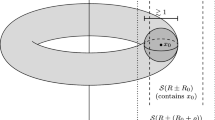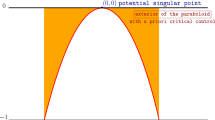Abstract
In this short paper we prove the global regularity of solutions to the Navier–Stokes equations under the assumption that slightly supercritical quantities are bounded. As a consequence, we prove that if a solution u to the Navier–Stokes equations blows-up, then certain slightly supercritical Orlicz norms must become unbounded. This partially answers a conjecture recently made by Terence Tao. The proof relies on quantitative regularity estimates at the critical level and transfer of subcritical information on the initial data to arbitrarily large times. This method is inspired by a recent paper of Aynur Bulut, where similar results are proved for energy supercritical nonlinear Schrödinger equations.
Similar content being viewed by others
Notes
This means that there exists a universal constant \(N_{univ}\in [1,\infty )\) such that for all \(M\ge N_{univ}\) and \(E\ge N_{univ}\) we have the result.
References
Albritton, D., Barker, T.: On local type I singularities of the Navier–Stokes equations and Liouville theorems. J. Math. Fluid Mech. 21(3), 1–11 (2019)
Barbato, D., Morandin, F., Romito, M.: Global regularity for a slightly supercritical hyperdissipative Navier–Stokes system. Anal. PDE 7(8), 2009–2027 (2015)
Barker, T., Prange, C.: Quantitative regularity for the Navier–Stokes equations via spatial concentration (2020). arXiv:2003.06717
Beirão da Veiga, H.: Existence and asymptotic behavior for strong solutions of the Navier–Stokes equations in the whole space. Indiana Univ. Math. J. 36(1), 149–166 (1987)
Bjorland, C., Vasseur, A.: Weak in space, log in time improvement of the Ladyženskaja–Prodi–Serrin criteria. J. Math. Fluid Mech. 13(2), 259–269 (2011)
Bradshaw, Z., Tsai., T.-P.: Global existence, regularity, and uniqueness of infinite energy solutions to the Navier-Stokes equations (2019). arXiv:1907.00256
Bulut, A.: Blow-up criteria below scaling for defocusing energy-supercritical NLS and quantitative global scattering bounds (2020). arXiv e-prints, page arXiv:2001.05477
Chan, C.H., Vasseur, A.: Log improvement of the Prodi–Serrin criteria for Navier–Stokes equations. Methods Appl. Anal. 14(2), 197–212 (2007)
Colombo, M., De Lellis, C., Massaccesi, A.: The generalized Caffarelli–Kohn–Nirenberg theorem for the hyperdissipative Navier–Stokes system. Commun. Pure Appl. Math. 73(3), 609–663 (2020)
Colombo, M., Haffter, S.: Global regularity for the hyperdissipative Navier–Stokes equation below the critical order (2019). arXiv:1911.02600
Colombo, M., Haffter, S.: Global regularity for the nonlinear wave equation with slightly supercritical power (2019). arXiv:1911.02599
Coti Zelati, M., Vicol, V.: On the global regularity for the supercritical SQG equation. Indiana Univ. Math. J. 65(2), 535–552 (2016)
Dabkowski, M., Kiselev, A., Silvestre, L., Vicol, V.: Global well-posedness of slightly supercritical active scalar equations. Anal. PDE 7(1), 43–72 (2014)
Dabkowski, M., Kiselev, A., Vicol, V.: Global well-posedness for a slightly supercritical surface quasi-geostrophic equation. Nonlinearity 25(5), 1525 (2012)
Escauriaza, L., Seregin, G.A., Šverák, V.: \(L_{3,\infty }\)-solutions of Navier-Stokes equations and backward uniqueness. Uspekhi Mat. Nauk. 58(2(350)), 3–44 (2003)
Giga, Y.: Solutions for semilinear parabolic equations in \(L^p\) and regularity of weak solutions of the Navier–Stokes system. J. Differ. Equ. 62(2), 186–212 (1986)
Ladyzhenskaya, O.A.: On the uniqueness and on the smoothness of weak solutions of the Navier–Stokes equations. Zapiski Nauchnykh Seminarov POMI 5, 169–185 (1967)
Lei, Z., Zhou, Y.: Logarithmically improved criteria for Euler and Navier–Stokes equations. Commun. Pure Appl. Anal. 12(6), 2715–2719 (2013)
McCormick, D.S., Robinson, J.C., Rodrigo, J.L.: Generalised gagliardo-nirenberg inequalities using weak lebesgue spaces and bmo. Milan J. Math. 81(2), 265–289 (2013)
Pan, X.: Regularity of solutions to axisymmetric Navier–Stokes equations with a slightly supercritical condition. J. Differ. Equ. 260(12), 8485–8529 (2016)
Rusin, W., Šverák, V.: Minimal initial data for potential Navier–Stokes singularities. J. Funct. Anal. 260(3), 879–891 (2011)
Seregin, G.: Leray-Hopf solutions to Navier–Stokes equations with weakly converging initial data. In: Mathematical Aspects of Fluid Mechanics, volume 402 of London Math. Soc. Lecture Note Ser., pp. 251–258. Cambridge Univ. Press, Cambridge (2012)
Seregin, G.: Lecture Notes on Regularity Theory for the Navier–Stokes Equations. World Scientific (2014)
Tao, T.: Global regularity for a logarithmically supercritical defocusing nonlinear wave equation for spherically symmetric data. J. Hyperbolic Differ. Equ. 4(02), 259–265 (2007)
Tao, T.: Global regularity for a logarithmically supercritical hyperdissipative Navier–Stokes equation. Analysis & PDE 2(3), 361–366 (2010)
T. Tao. Quantitative bounds for critically bounded solutions to the Navier–Stokes equations (2019). arXiv:1908.04958
Acknowledgements
The second author is grateful to Patrick Gérard for bringing to his attention the result of Aynur Bulut [7].
Funding
The first author is supported by a Leverhulme Early Career Fellowship funded by The Leverhulme Trust. The second author is partially supported by the project BORDS Grant ANR-16-CE40-0027-01 and by the project SingFlows Grant ANR-18-CE40-0027 of the French National Research Agency (ANR).
Author information
Authors and Affiliations
Corresponding author
Ethics declarations
Conflict of interest
The authors declare that they have no conflict of interest.
Additional information
Communicated by G. Seregin.
Publisher's Note
Springer Nature remains neutral with regard to jurisdictional claims in published maps and institutional affiliations.
Rights and permissions
About this article
Cite this article
Barker, T., Prange, C. Mild Criticality Breaking for the Navier–Stokes Equations. J. Math. Fluid Mech. 23, 66 (2021). https://doi.org/10.1007/s00021-021-00591-1
Accepted:
Published:
DOI: https://doi.org/10.1007/s00021-021-00591-1




